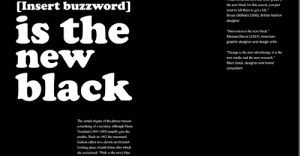
In his analytical study, The Ideologies of African American Literature, Dr. Robert Washington asserts that, “In preindustrial structures of domination, the ruling group typically controls not only the subordinate group’s economic and political life, but also its cultural representations—namely the ideas and images inscribing its social identity in the public arena. In this country that ruling group has always been white Americans and the primary subordinate group has been Blacks.
Washington goes on to explain that in this relationship the dominant group defines what symbols, expressions and meanings are representative of the subordinate group. These representations emanate from the dominant group’s ideological biases toward the others. Words and expressions have historically been manifestations of those biases. Black is the only color defined in dictionaries by the use of negative adjectives. For example in the American Heritage Dictionary, black is equated with evil, wicked, dirty, soiled as from soot, depressing, angry, gloomy and sullen. It is quite evident that the intent was to create a negative and destructive image of the color black and all objects and persons associated with it. Conversely, the color white is associated with perfect human beauty, especially female beauty.
Historian Dr. Winthrop D. Jordan exposed the manner in which the two colors have been juxtaposed throughout history. He wrote in his award winning book, White Over Black, “No two colors implied opposition as white and black. White and black connoted purity and filthiness, virginity and sin, virtue and baseness, beauty and ugliness, beneficence and evil, and God and the devil. These identifications are necessary in order for whites to justify their historically misguided belief in the inferiority of the Black race to them. Over decades, anything or anyone considered black was viewed negatively. Even African Americans did not want to be associated with their color. Skin lighteners, hair straighten formulas were very fashionable.
The term experienced a brief reprieve during the Black Arts Movement when both writers and musicians made black a term of endearment. Maya Angelou glorified the word black in her poem Phenomenal Woman, Stokely Carmichael gave it strength with his cry “Black Power,” and James Brown sang of black pride with “Say it Loud, I’m Black and I’m Proud.”
But the reprieve was short lived and the color black is once again equated with negative images and connotations. kYmberly Keeton, a brilliant, talented, artistic young sister believes the term slipped back into darkness at the turn of the century. Ten years later with the release of Helena Andrews’ memoirs, Bitch is the New Black, and three years after her book, with the Netflix series, Orange is the New Black, the color was again under severe attack.
I personally take a great deal of pride in referring to myself as a Black man. I am blessed to have been born into a Black family and to be the descendant of great Black men and women who survived an abusive and sick system of exploitation. They made it up the rough side of the mountain, and left us with a legacy of strength, beauty and love. There is nothing negative or hateful about them at all.
I reject the suggestion that bitch and Black women are synonymous. My wife, sisters and my daughters are not bitches nor are the millions of other beautiful Black women who take pride in their race and color. And the insinuation that prison life is somehow a part of Black life is blatantly false. There are approximately one million Black men and women locked up (which I agree is far too many) out of a total population of thirty million. Three percent is not a fair representation of the Black race. If these writers must equate a color to a negative definition and meaning, why not title their works as Bitch is the New White, and Orange is the New White and give black a well-deserved rest.
